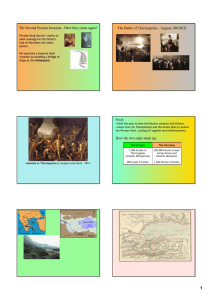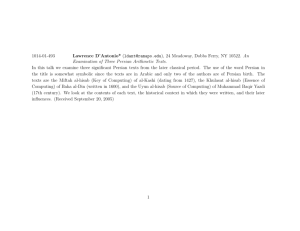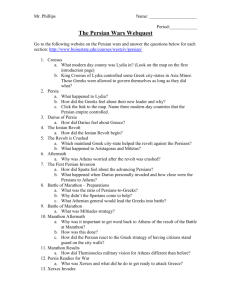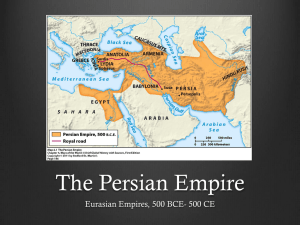lesson template - History Channel
advertisement
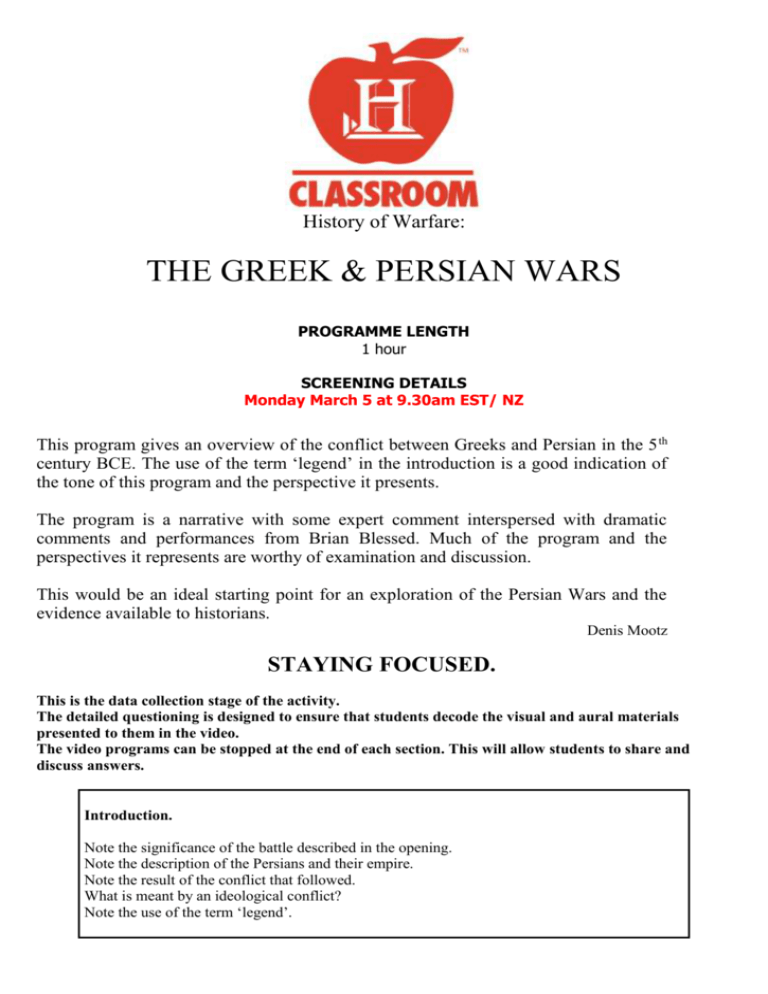
History of Warfare: THE GREEK & PERSIAN WARS PROGRAMME LENGTH 1 hour SCREENING DETAILS Monday March 5 at 9.30am EST/ NZ This program gives an overview of the conflict between Greeks and Persian in the 5 th century BCE. The use of the term ‘legend’ in the introduction is a good indication of the tone of this program and the perspective it presents. The program is a narrative with some expert comment interspersed with dramatic comments and performances from Brian Blessed. Much of the program and the perspectives it represents are worthy of examination and discussion. This would be an ideal starting point for an exploration of the Persian Wars and the evidence available to historians. Denis Mootz STAYING FOCUSED. This is the data collection stage of the activity. The detailed questioning is designed to ensure that students decode the visual and aural materials presented to them in the video. The video programs can be stopped at the end of each section. This will allow students to share and discuss answers. Introduction. Note the significance of the battle described in the opening. Note the description of the Persians and their empire. Note the result of the conflict that followed. What is meant by an ideological conflict? Note the use of the term ‘legend’. Act 1. Note Brian Blessed’s qualifications. Note Blessed’s comment on Persian attitudes to Greece. Note Blessed’s description of Athens. Why did Persia ‘want’ Greece? Note the Greek expansion into Asia Minor. Note how Persian ‘rule’ is described. Note details of the Persian Empire. What according to Dr David Chandler caused Persia’s defeat? Note details of the Greek revolt in Asia Minor. Why did Greek states help the revolt? Result? Why did the Athenians withdraw from the revolt? How did the Persians respond to the revolt? Result? What was the aim of the Persian king after the revolt? What aided Darius’s cause? Result? Note the symbols of submission to Persia. Which Greek states resisted the Persians? Why? Result? What was Darius’s aim? Note details of Hippias. What role would Hippias play in Persian strategy? Note the Persian advance on the Greek mainland. Result? Note the comments by Dr J.B. Salmon. Implications? What was the “problem” for the Persians? Implications? How would the Greeks counter the Persian’s advantages? Who chose Marathon as the landing site? Why? Note details of the Persian forces. How did the Athenians respond? Result? Note details of the Athenian commander. Note Brian Blessed’s description of Sparta. Note the comments on Spartan ‘superstitions.’ Result? Who supported Athens? What was the Athenian strategy? Note the comments on hoplites. Why were the Greeks ‘scared’ of the Persians? Why was the Greek army ‘superior’ to the Persians? Result? Act 2. What was the role of light infantry / skirmishers? Result? Note Salmon’s comments on Greek ‘unity’. Implications? Result? What does “osismos” mean? Implications? Result? Note details of the Persian forces. What was their strength? Result? Note the basic Persian strategy. Result? Why did Datis load the Persian cavalry into his ships? Implications? Result? Note the tactics adopted by Miltiades. Result? How were Athenian generals ‘appointed’? Note Salmon’s comments on generals. Note the details of the battle at Marathon. Result? Note Blessed’s description of the ‘marathon’. Why did the Athenians have to march to Phaleron? Result? Note Blessed’s description of Xerxes and his motives. Note details of Xerxes’s army. Why did Greek states surrender and join the Persians? Result? When did the Persians meet resistance? Note details of the Hellenic League. Who was the military leader of the Greeks? Note the proclamation issued by the League. Result? Why was there disagreement among the Greeks? Result? Why was Thermopylae chosen for the stand against Persia? Act 3. Note the description of the pass at Thermopylae. Who led the Greeks? What was the strong point of Leonidas’s position? What was the weakness of the position? Note Blessed’s description of the Spartans. Note Blessed’s description of Xerxes reaction to Spartan nonchalance. Why did Xerxes halt before the ‘gates’? Why could the Persians make no impression on the first two days? Result? Note the means by which the Spartans were defeated. Why did some Greeks escape? Note Salmon’s comments on the Spartan intention at Thermopylae. Note Blessed’s description of the final stand. Note the fate of Athens. Where did the Greeks expect to fight their last stand? Result? Note the comparative strengths of the Greek and Persian fleets. Why did the Athenians resist efforts to move the fleet? Result? Note the development of the Athenian fleet. Note details of the battle of Salamis. Result? Note the role of Themistocles in the battle of Salamis. Result? Why were the Persian ships at a disadvantage in the straits at Salamis? Result? Why did Xerxes abandon the invasion of Greece? Note the forces left in Greece with Mardonius. Note the discussion of Xerxes supply problems. How successfully did Xerxes solve these problems? Result? Act 4. Why did Mardonius burn Athens again? Result? Note details of the battle of Plataea. Note the role of Pausanius. What advantages did Mardonius have at Plataea? What advantage did the Greeks have at Plataea? Why did the Greek forces withdraw from the plain? Result? Why were some Athenians contemplating joining Persia? Implications? Note the discussion of unity and disunity. How did the Spartans turn the table on the Persians? What was the turning point of the battle? Result? Note Blessed’s comments on the significance of the Greek victory. Note the aftermath of the Persian invasion. Note the impact of the war on Athens. Result? Implications? Who would finally solve the Persian ‘problem’? EXTENSIONS. Useful, interesting, challenging, books, sources and websites will provide materials to supplement and complement the History presented in the video program. The data collected here should be used in the notemaking below. Some useful Internet sites: Persian Wars: http://en.wikipedia.org/wiki/Greco-Persian_Wars http://www.boisestate.edu/courses/westciv/persian/ http://languages.siuc.edu/classics/Johnson/GreekCiv/alia/Persian.html http://people.hsc.edu/drjclassics/lectures/history/PersianWars/persianwars.shtm http://www.usu.edu/markdamen/1320Hist&Civ/chapters/02HEROD.htm http://www.livius.org/he-hg/herodotus/herodotus01.htm Persian Empire: http://en.wikipedia.org/wiki/Achaemenid_Empire http://www.parstimes.com/library/brief_history_of_persian_empire.html http://www.metmuseum.org/toah/hd/acha/hd_acha.htm Ionian Revolt: http://en.wikipedia.org/wiki/Ionian_Revolt http://www.livius.org/he-hg/herodotus/logos5_14.html http://www.livius.org/he-hg/herodotus/logos5_15.html Hippias: http://en.wikipedia.org/wiki/Hippias_(tyrant) http://www.britannica.com/EBchecked/topic/266589/Hippias Miltiades: http://en.wikipedia.org/wiki/Miltiades_the_Younger http://www.livius.org/mi-mn/miltiades/miltiades.html Battle of Marathon: http://en.wikipedia.org/wiki/Battle_of_Marathon http://www.livius.org/man-md/marathon/marathon.html http://www.eyewitnesstohistory.com/marathon.htm Darius: http://en.wikipedia.org/wiki/Darius_I http://www.livius.org/da-dd/darius/darius_i_0.html Phalanx: http://en.wikipedia.org/wiki/Phalanx_formation http://www.livius.org/pha-phd/phalanx/phalanx.html http://en.wikipedia.org/wiki/Ancient_Greek_warfare Xerxes: http://en.wikipedia.org/wiki/Xerxes_I_of_Persia http://www.livius.org/x/xerxes/xerxes.html Leonidas: http://en.wikipedia.org/wiki/Leonidas_I http://ancienthistory.about.com/cs/people/g/leonidas.htm Battle of Thermopylae: http://en.wikipedia.org/wiki/Battle_of_Thermopylae http://www.livius.org/th/thermopylae/thermopylae2.html http://www.livius.org/arl-arz/artemisium/artemisium.html Battle of Salamis: http://en.wikipedia.org/wiki/Battle_of_Salamis http://www.livius.org/saa-san/salamis/battle.html http://www.livius.org/th/themistocles/themistocles.html Mardonius: http://en.wikipedia.org/wiki/Mardonius http://www.livius.org/man-md/mardonius/mardonius.html Battle of Plataea: http://en.wikipedia.org/wiki/Battle_of_Plataea http://www.livius.org/pi-pm/plataea/battle.html http://www.livius.org/pan-paz/pausanias/pausanias.html http://en.wikipedia.org/wiki/Battle_of_Mycale NOTEMAKING. This is the collation stage of the activity. Students need to organise the field of information and begin to explore its context. Directions and /or Inquiry questions are provided for notemaking / summary exercises that will follow the viewing of the video. The materials / data for the summaries have been collected above. The activity could be done in teams, groups, or by individuals, or as a class with teacher direction. 1. Draw up a timeline / chronological chart of the events described and discussed in this program. 2. Note details of the Persian Empire. 3. Note details of the Persian Kings Darius1 and Xerxes. 4. Note details of the Hellenic League. 5. Note details of the causes of the Persian Wars. 6. Note details of the first invasion. 7. Note details of the Battle of Marathon. 8. Note details of the second invasion. 9. Note details of the Battle of Thermopylae and Artemision. 10. Note details of the Battle of Salamis. 11. Note details of the Battle of Plataea. 12. Note details of the Battle of Mycale. 13. Note details of the role of individuals such as Miltiades, Themistokles, Leonidas and Pausanias. ISSUES & INQUIRY. Key issues and inquiry questions that have been raised by the video are addressed at this stage for discussion and research. 1. In what sense were the Persian Wars an ideological struggle? Was Persia a “tyrannical empire”? Were the Greeks “democracy loving”? 2. In what sense is the narrative presented in this program a ‘legend’ of East versus West? PROBLEMS of EVIDENCE. Questions of reliability and validity of the perspectives, evidence and sources presented in the video program need to be considered, tested and researched. 1. Why does the program neglect to mention the battles at Artemision and Mycale? Were these important? Should this make us skeptical of its overall accuracy and reliability? 2. What does the actor Brian Blessed contribute to this narrative? Are his commentaries and re-enactments accurate? Should they be accurate? COMMUNICATING. The key issues and inquiry questions are potential topics for debate, essay writing, reports, historical recount and explanation. 1. Write a REPORT on the Persian Empire. 2. Prepare notes (both sides) for a DEBATE of the proposition that The Greeks were victorious because the Persians were inept and badly led. 3. Assess the factors that contributed to the Greek victory in the wars with Persia.

